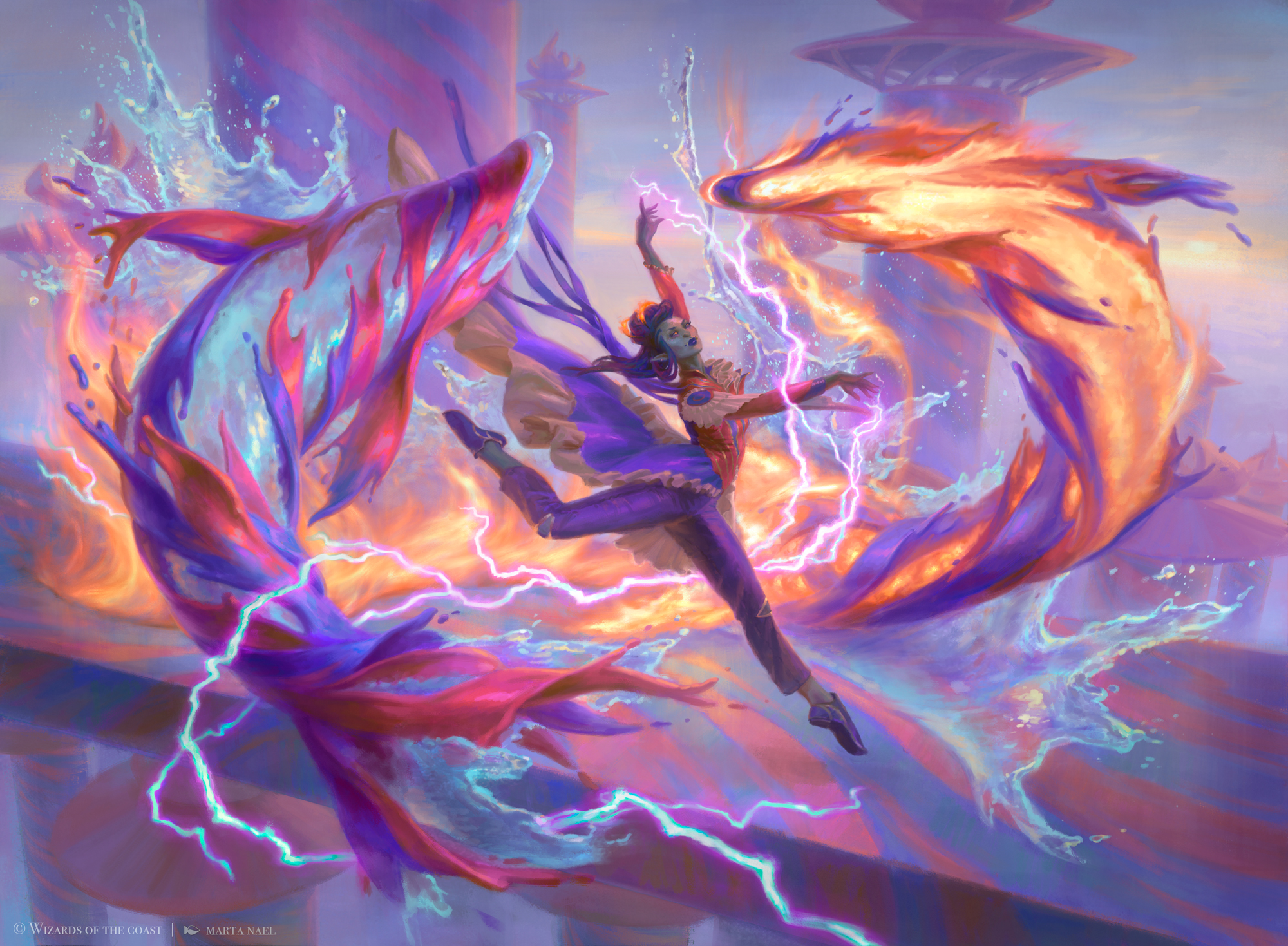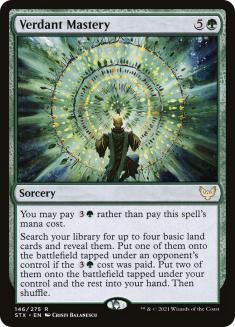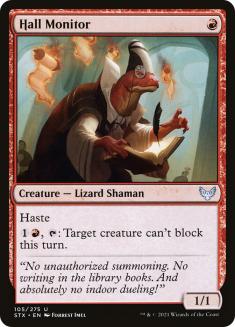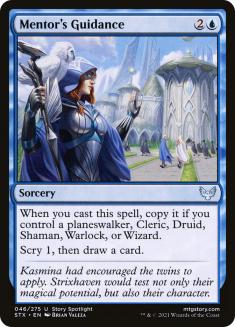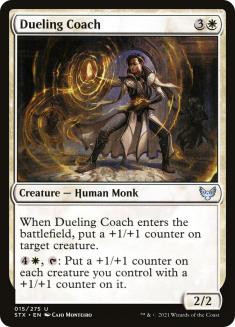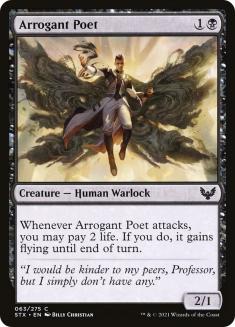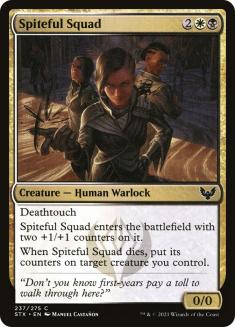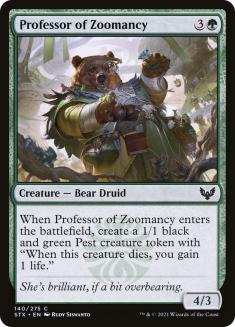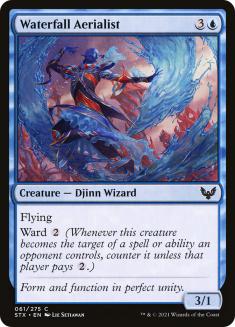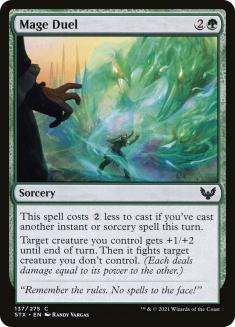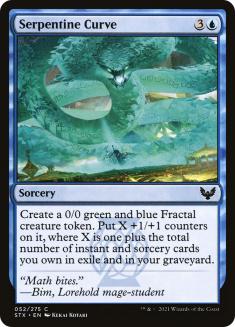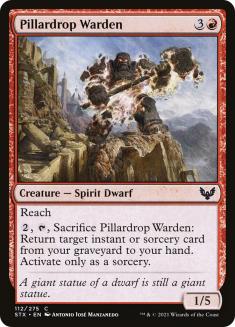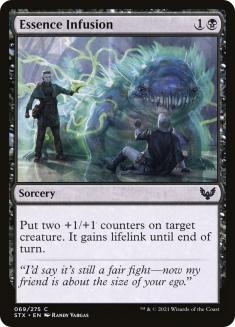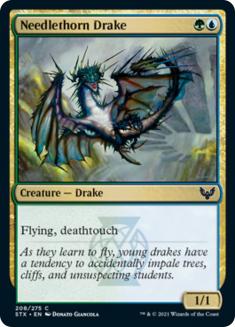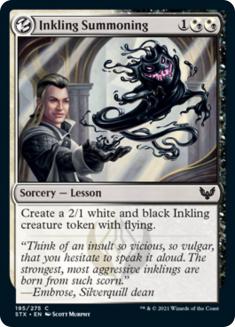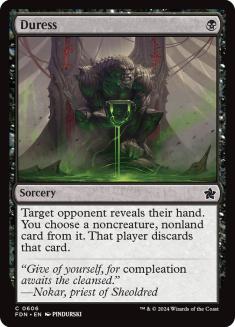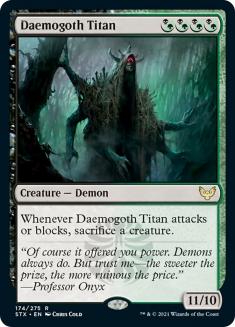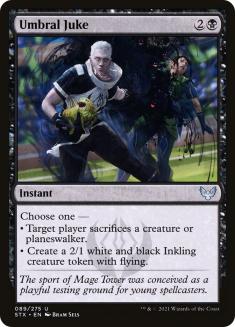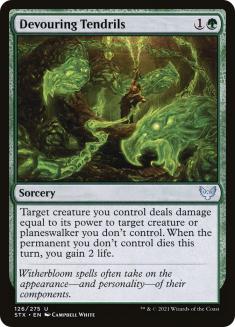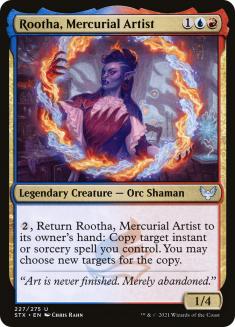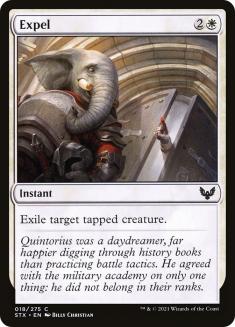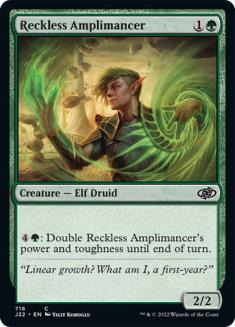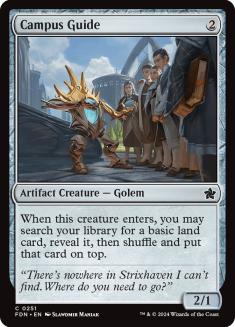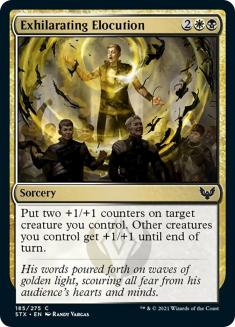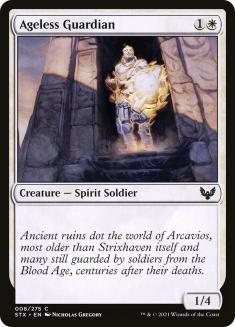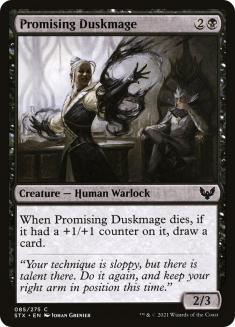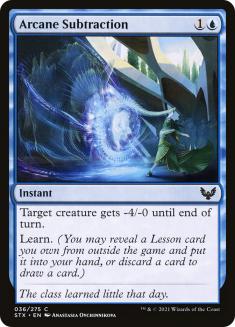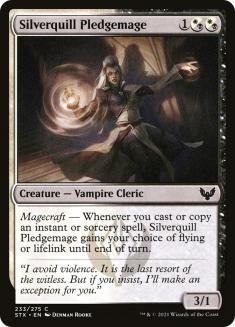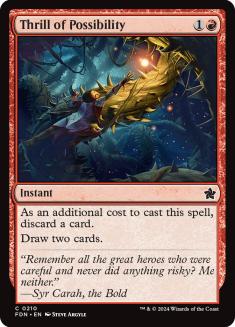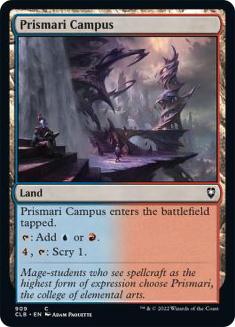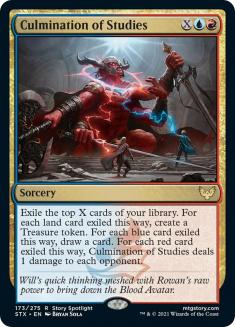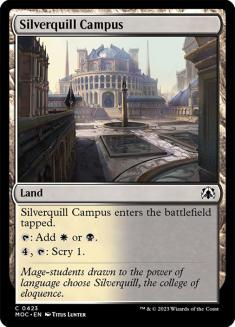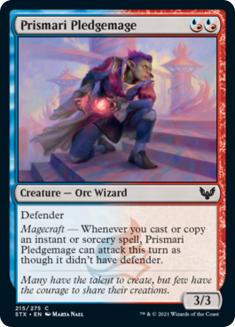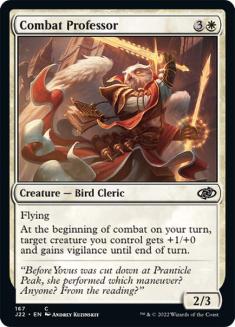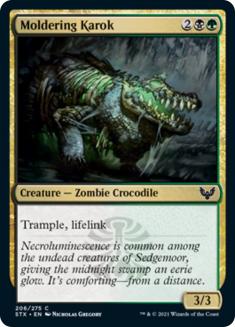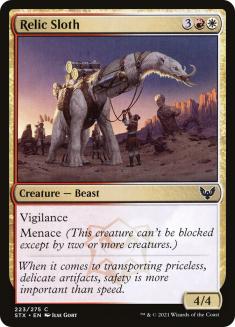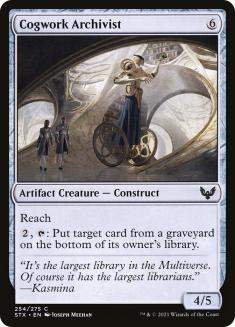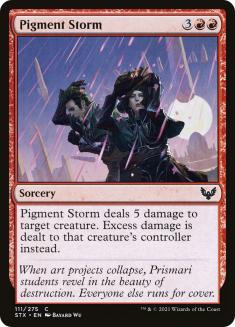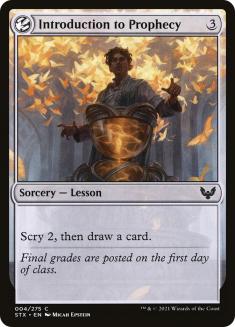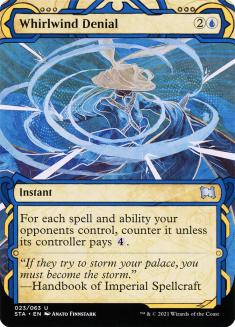Strixhaven is looking like an incredibly involved, complicated, and fun Draft format. Here’s what we know so far:
- This is a guild set covering the archetypes described below. A hint to a complex format is that these archetypes are not as strongly defined as they usually are. Payoffs and enablers will likely bleed across many color pairs, and the nuances between how they mix will be important to learn quickly.
- Quandrix (U/G): Appears to be the usual damp broccoli strategy of drawing cards and ramping (multicolor splashes too of course).
- Prismari (U/R): A spells archetype. Prismari Apprentice hints at casting large spells and Elemental Masterpiece helps showcase that option.
- Lorehold (W/R): I’m unsure how this one will work out, but there are many themes that are sprinkled across this color pair. We see magecraft, 3/2 Spirit tokens, and caring about removing things form the graveyard. Not sure how the archetype will manifest, but it might not be as fast as white and red usually are.
- Silverquill (W/B): This archetype makes a good chunk of 2/1 flying tokens and can spread +1/+1 counters pretty easily.
- Witherbloom (B/G): A new take on black-green that’s really more at the intersection of Rakdos and Orzhov. This archetype loves sacrificing creatures for benefit and also has a variety of cards that gain life and/or care about gaining life.
- Packs have a specific structure where there’s always a slot dedicated to having a Lesson card, and another slot dedicated to having a card from the Mystical Archive.
- The main mechanics of magecraft and learn exist en masse across every available archetype.
It’s very difficult to figure out what the format will look like just from ingesting all the available cards and archetypes. My initial expectation is that the format will be on the slower side, as none of the archetypes are focused on speed like Boros usually is. Furthermore, learn and magecraft reward setting up particular sequences of spells. So I expect the average turn length to be longer than most formats, but this doesn’t mean you can just skimp on two-drops. Battlefield presence is still going to be important, and I expect some magecraft dedicated decks will be able to piece together kills out of nowhere, so be on the lookout for that!
With all of this in mind, let’s jump into a draft. Thanks to the wonderful developers at DraftSim.com, we can simulate drafts before the set goes live on Magic Online or Magic Arena. Would you make the same picks I did in the draft below?
Pack 1, Pick 1
The Pack:
The Pick:
Hall Monitor and Dueling Coach both have low-impact bodies for their cost, but high-impact activated abilities in the right archetype. In my experience, these aren’t cards you should first-pick, but are instead rewards for when you end up in an archetype that properly supports them. I wanted to highlight them as considerations because there are certain worlds of this format where their corresponding archetypes are so good that they should be taken to bias down a path with a high probability of drafting the best deck. That being said, they aren’t correct picks without a very strong bias in that direction.
Verdant Mastery will get many other players excited, but it’s just not my shtick. The four-mana default of double-ramp and draw a land, at the cost of giving an opponent a land, is still a two-for-one that fixes you and puts you ahead on mana. But that still doesn’t describe some busted rare, just a solid fixing spell. It might be the correct pick out of this pack, and I wouldn’t fault anyone for taking this early to get data on a rare, but if I’m taking a green card I would rather take Mage Duel.
At one mana, Mage Duel is top-common quality. At three, it’s probably good, but not first-pick quality. Again, this also might be the best card to take out of this pack. However, I’m not going to take either of the green cards. A large reason for this is that I’ve played many similar cards to them before. I believe I have a good understanding of the cards that go with them and how to make them good.
Early in the format, for me, the highest-value decisions are about exploration. I need to explore the spaces that are unknown to me such that eventually I understand everything well enough I can exploit my knowledge. In my day-job-field, this explore versus exploit dilemma is referred to as the multi-armed bandit problem (but that’s a story for another time).
To me, this points to Mentor’s Guidance as the highest-value pick. I think I have a good grasp on the general archetypes and cards in this set, but the main mechanics of magecraft and learn puzzle me. Taking a Divination variant clearly meant to maximize magecraft sets me down the path to discover as much as possible about how copying spells can have important interactions in the format.
Pack 1, Pick 2
The Picks So Far:
The Pack:
The Pick:
Devouring Tendrils is a solid Rabid Bite variant, but I don’t think the extra two life is worth the uncommon upshift. Rabid Bite has always been good, but it has never been particularly impressive. For example, I expect Mage Duel to end up a better green card in this format than Devouring Tendrils. I think Devouring Tendrils is a slightly worse card than Umbral Juke, but given that Dimir is not a deck in this format, it’s entirely possible that Tendrils is the correct card to follow up a blue card with. However, the other three options in this pack are better options.
Daemogoth Titan has some terrifying stats, but also a terrifying ability. More importantly, the ability is not as a cost. This means that, if your opponent interacts with what you were intending on sacrificing with Daemogoth Titan’s trigger on the stack, you will be forced to sacrifice something else. A strong Witherbloom deck with lots of Pest tokens will make good use of this card; I’m just not so certain if that kind of deck will be easy to draft. In fact, if I look at the commons that make Pest tokens, there are only three of them (and one is a Lesson I don’t intend on starting in my deck). Given this, I don’t think I will speculate on the Titan. This could be a huge mistake, and exploring this variant of Golgari may actually be the correct move. However, I’m going to continue to push down the magecraft path, leaving me with two options.
Arcane Subtraction is the safe, monocolored choice. Taking the only blue common sends a nice signal downstream too. However, I don’t think I can get behind the safe pick. I like Subtraction a lot in magecraft decks because it can get a Lesson that also triggers magecraft. However, I don’t think passing up on a powerful magecraft gold uncommon is worth the safety of Arcane Subtraction. Rootha, Mercurial Artist has a reasonable body to block with, and an explosive text box. Especially because Prismari seems to be all about casting expensive spells, adding a repeatable way to copy them is dangerously powerful. I think speculating on the ceiling Rootha provides is worth more than anything else in this pack has to offer (unless I am wrong about Daemogoth Titan, and it is easy for Witherbloom to support it, in which case passing it is a huge mistake).
Pack 1, Pick 4
The Picks So Far:
The Pack:
The Pick:
At this point, especially with this pack, it’s quite unlikely that I draft anything other than a Prismari spells deck. The real question is what pick sets me up best to draft the best version of that deck. Whirlwind Denial and Pigment Storm provide interaction. Culmination of Studies provides an over-the-top mana sink and potentially game-ending spell. Prismari Pledgemage presents fantastic defensive speed. Prismari Campus provides the best mana possible, and probably opens the door to a multicolor Quandrix deck. And lastly, Introduction to Prophecy is the generic good-card Lesson that can help me both setup the best magecraft hand as well as go off with lots of triggers later in the game.
In a few weeks, the pick out of this pack will be obvious, but without playing the set at all it’s impossible to know what’s correct to prioritize. My current expectations are that Culmination of Studies requires too much mana to reliably provide enough cards back for your investment to be the correct pick here. Prismari Campus is the safest pick, but I expect one of the other options will turn out crucial in ways that lead it to be a higher pick than the dual land. Between the two interactive spells, I would guess that Whirlwind Denial is a better card than Pigment Storm. Five mana and sorcery speed is just too inefficient for me to be happy about it.
This leaves Prismari Pledgemage and Introduction to Prophecy as the most likely options for an irreplaceable effect that helps lead down the best Prismari path. Pledgemage not only can hit hard, a great blocker to help set up for these big explosive turns sounds perfect. So, I’m taking the Pledgemage for now because I think it’s extremely likely that it’s important for successful Prismari decks. However, I wouldn’t be surprised if a sideboard well-stocked with Lessons turns out to be crucial for success in this archetype such that the correct pick turns out to be Introduction to Prophecy.

